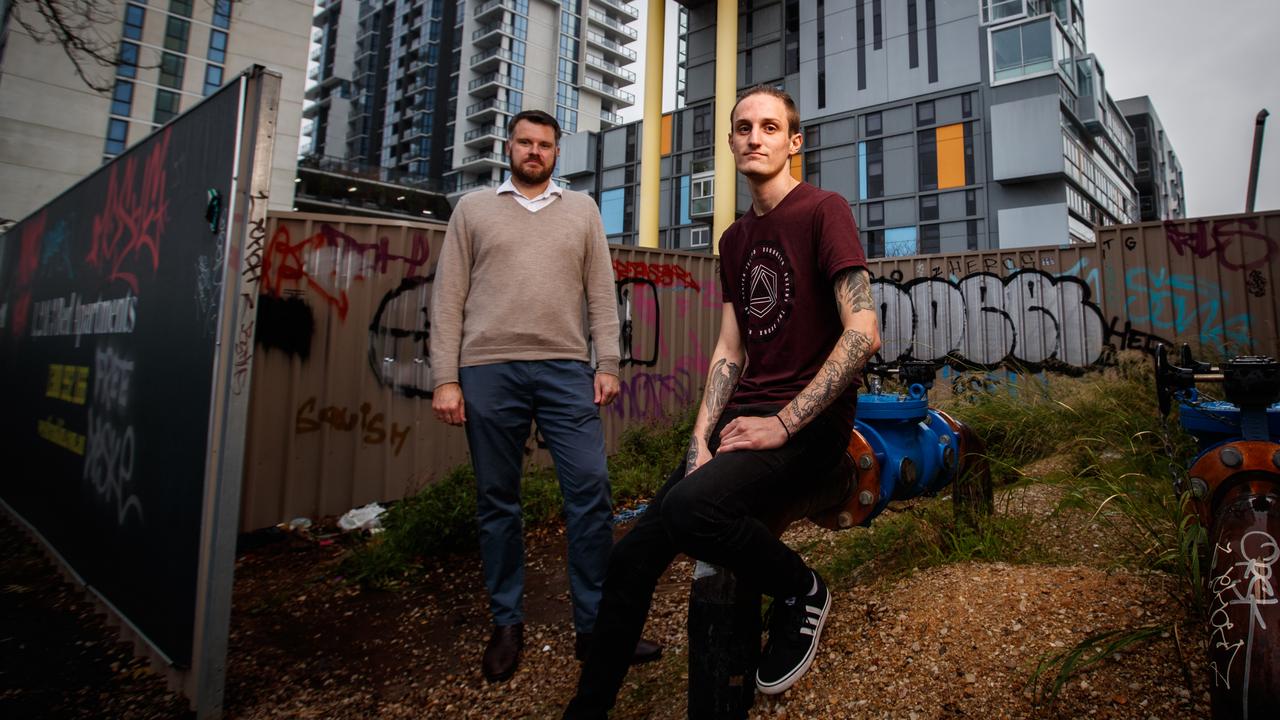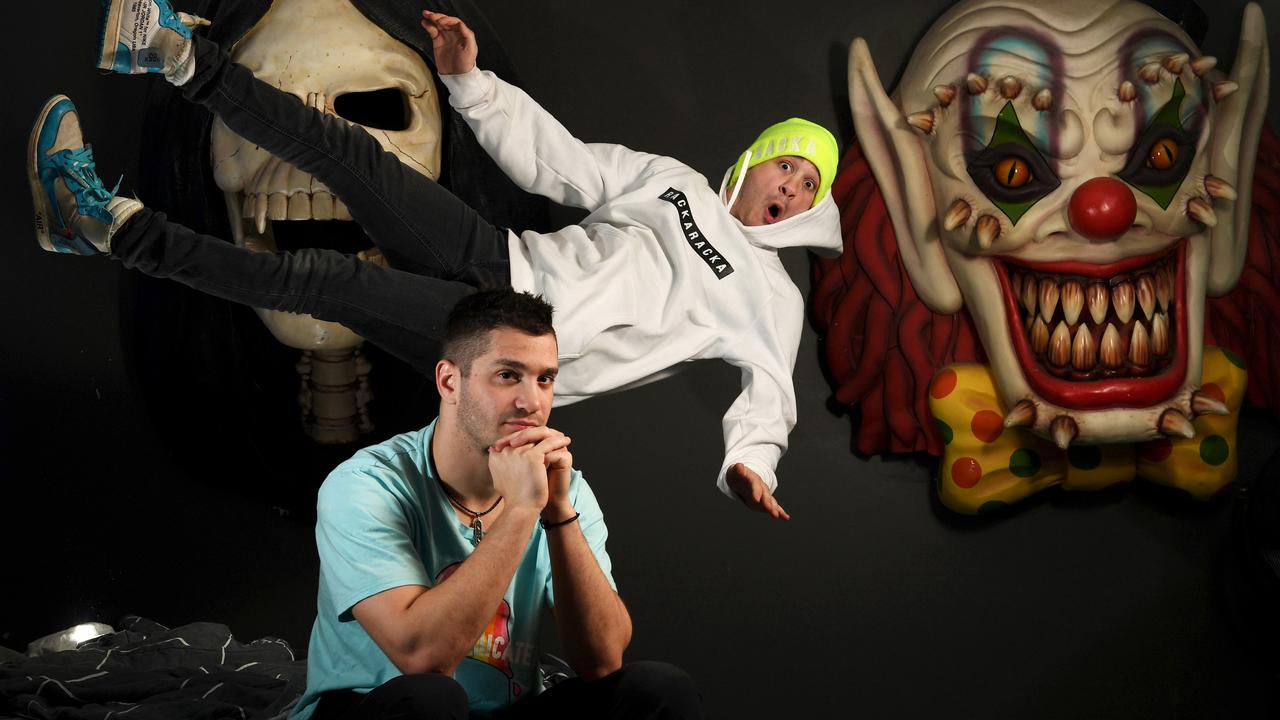Jess Trengove: Guts, grit and world marathon success
SHE started running as a kid in Naracoorte and this year finished in the top 10 at the world marathon championships. With a Commonwealth Games bronze already, and the Gold Coast Games beckoning, how good can Jess Trengove be?
SA Weekend
Don't miss out on the headlines from SA Weekend. Followed categories will be added to My News.
HOW far do you want to go?” asks Jess Trengove as she casually stretches her calf muscle on a concrete step at the old grandstand in Victoria Park.
That sounds a bit ominous, coming from one of the best marathon runners in the world. I’m just a reporter who has come along to one of Trengove’s training sessions to try to discover what makes her tick.
And I’m meant to be the one with the questions. So I hedge my bets and ask: “How fast are you going?”
Trengove, 30, says she plans to run for about 90 minutes at “4.20 pace”, which in running talk means 4min 20sec per kilometre.
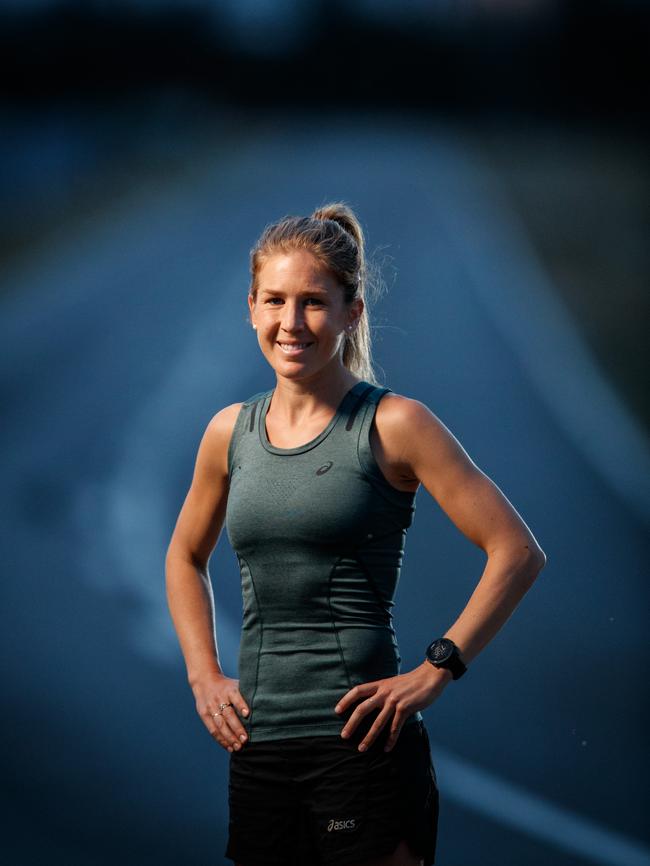
Hmm. It is a warm Wednesday morning in October and the temperature has hit 28C before 8am. Trengove – who runs twice a day every day – has just returned to Adelaide from the Melbourne Half Marathon and this is one of her weekly “long runs”.
I decide I’ll try and hang on to her, and her running partner, steeplechaser Max Stevens, 22, for half-an-hour.
Seventeen minutes and 4km later – legs hurting and chest heaving – I’ve had enough. I could talk at that speed but in broken sentences and towards the end I was happy to say nothing at all.
And that was 4.20, sedate compared to Trengove’s marathon pace at 3.28. That’s 3min 28sec per kilometre – or about level 17 on the treadmill – for 42.2km with no rest.
That’s when it gets hard for Trengove, too. Only her version of feeling uncomfortable is getting a metallic taste in her mouth, a burning sensation in her throat and feeling like her ribs can’t expand enough to get the air in. Her legs are heavy, like they’re made of cement but could crumble underneath her at any time, and, when her toenails start to come off, a sharp jolt goes up her big toe and through her foot with every step. So she lets her mind wander to distract her from the pain.
As Trengove has discovered, in her journey from running laps of a pine forest around Naracoorte as a kid to the streets of London and Rio in Olympic Games, the power of positive thinking is every bit as important as the two legs driving her to the finish line.
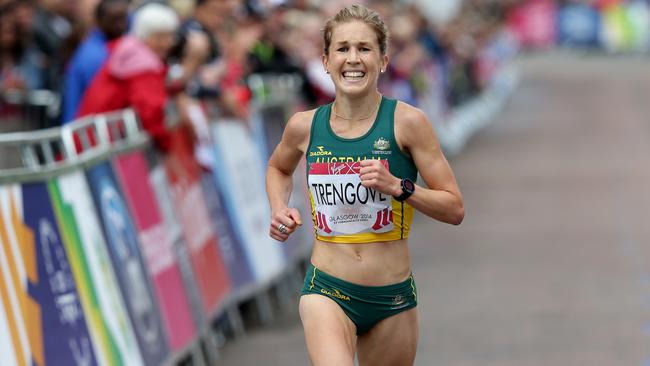
When her rivals accelerate and she feels like she’s losing touch, Trengove imagines she is holding a rope that is tied around their waists and dragging her with them. “Or if we are going up a hill I’ll think of a helium balloon wrapped around me pulling me up, or a whole crowd of people pushing me up,” she says. “Or a wedge in the wind, thinking of yourself at the front of a ship cutting through the wind to distract you from the fact that it’s hard.
“And I’ll think of people who have inspired me or special moments in my life, reflections in my mind to try to inspire me.”
Physical toughness hasn’t always come naturally to Trengove, who in August recorded the best ever finish by an Australian woman with ninth at the marathon world championships in London.
“I used to get told off in netball for not being aggressive enough. I’d be like, ‘Oh sorry’,” she says. “And I didn’t like to get into that argy bargy of it all.
“But I think in marathon running what I love is this idea that everyone is trying to conquer the distance as much as beating the people around you. Part of the goal is trying to nail the run itself. At the same time people do throw some elbows and that adds to the adrenaline of it all.”
Funnily enough, the question “How far do you want to go?” is why Trengove is even doing this in the first place.
It was her coach Adam Didyk who asked her that very thing then told her to write down her answer when they started working together in 2008 when Trengove was 21.
“I wrote my goal is to represent South Australia again and Adam said ‘That’s your big goal?’” Trengove recalls. “And I was like ‘Oh, any kid’s dream is to run at the Olympics’ and Adam said ‘Well, write it down’. But I can remember at the age of 21 thinking ‘That’s just outrageous but I’ll write it anyway’.”
Nine years, nine marathons, two Olympic Games and one Commonwealth Games bronze medal later and it’s fair to say Trengove has exceeded her expectations, but she still wants more as she strives towards next year’s “home” Commonwealth Games on the Gold Coast and 2020 Tokyo Olympics.
It’s not easy to catch the 30-year-old and that’s when she’s not running. She was averaging two interstate trips a week during October for guest speaking, sponsor and racing commitments.
When she is in Adelaide she combines training with all those things as well as work as a physio and co-ordinating an athletic underwear business called “Rundies”.
In a big training week leading into a race, Trengove will cover anything from 165-200km while making sure she gets nine hours’ sleep a night.
“I’m big on getting enough sleep,” she says.
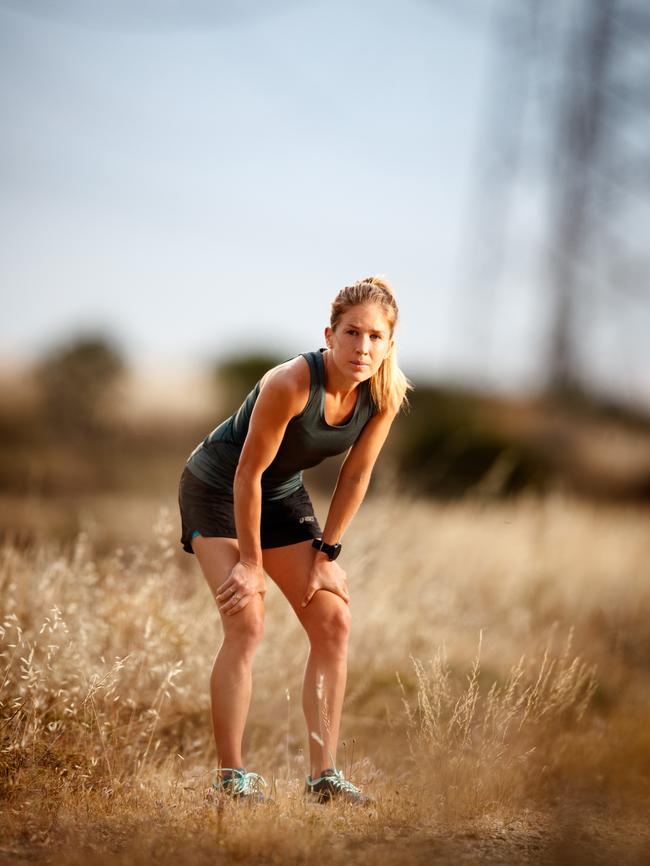
Trengove is disciplined with her diet in the six weeks leading into a race, however, doesn’t measure herself by bodyweight but by skinfolds, which show a percentage of body fat.
In a 24-hour period in heavy training she will typically eat:
● A muesli bar, banana or piece of toast before her morning run, which can be anything from 10-20km.
● Breakfast post-training is a protein pancake including a banana, egg, linseed, chia seeds, cinnamon, yoghurt and berries.
● By mid-morning she has a coffee while lunch is usually cold rolls or a focaccia and before her evening run she will eat muesli and yoghurt or fruit.
● Dinner is meat and vegetables or salmon, rice noodles, stir-fry or curry with rice. She will have fruit and yoghurt or a milk drink before bed.
But the energy to run all starts in the mind.
“In order to become physically strong you have to be mentally strong, so I feel like that comes first,” she says. “You’ve got to be motivated, determined and willing to push through pain and boredom to even line up for the race.
“A lot of people think the marathon is where you have to really tough it out mentally more than any other moment, but I actually think training is harder.
“In a training session you’re out there sometimes on your own, there is no crowd support. At the end you might be going for coffee so you try to get excited but there is always knowing the next day you’ve got to back up and do it again.
“Whereas on race day you think you’ve just got to tough through whatever pain comes my way and at the end is a huge reward, there are people supporting me and you get a bit more emotional.”
Marathon training is long and hard, nastily cold in winter, brutally hot in summer, and sometimes lonely.
“If I go for more than two or three days of lacking motivation I recognise that I need to find a new running group or someone to run with,” she says.
The feeling of isolation doesn’t just happen in training, it can extend to race day as well when Trengove finds herself surrounded by international rivals and many who don’t speak English.
“I noticed a couple of the African nations will gather together in a small group before a race and I wonder what they’re discussing,” she says. “And there are points at particular water stations where athletes will go and grab a water bottle and the others won’t, they’ll just share it around.
“In London this year, my teammate Sinead Diver came up alongside me 15km in and said ‘Keep going’ and I immediately felt so confident and relaxed having another Aussie next to me, it was nice.”
At the 2014 Glasgow Commonwealth Games, where Trengove won a bronze medal, she wanted to congratulate the two Kenyans who finished first and second but they couldn’t understand what she was saying.
But in a race that takes around two-and-a-half hours to complete, Trengove has learnt to respond with her legs and not her lips.
“I’m just learning how important it is to respond to changes in pace. I always thought in a marathon you just run at a steady pace to get the most out of yourself,” she says. “But in championship races particularly you need to be prepared to change your pace, but I used to think if you get into a level of lactate surely it would be very difficult to get out of that, but I realised in London that you can.
“We train our body well to buffer lactate, we do fartlek sessions (a training method that blends continuous training with interval training) to simulate that, but I always feared trying to surge in a marathon, thinking it could be my undoing.”
Teaching your body to “buffer” lactate is not fun apparently. In essence it means physically exerting yourself to a point where your body is screaming at you to stop but instead of stopping you teach it to get rid of the toxins and keep going.
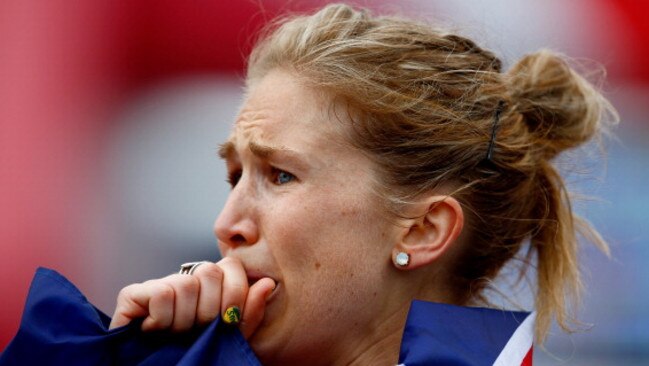
A typical session for Trengove to do that is to run 1km at about 3.20 pace then do 600m at 3.28 pace then repeat multiple times.
Trengove believes she was born to run, but it took her the best part of 20 years to realise that meant running marathons – the most gruelling event on the Olympic program.
“I grew up in the country and firmly believe I have it in me to run marathons because I love the outdoors,” says Trengove, who lived in Naracoorte until she went to boarding school in Adelaide at the age of 16.
“If you don’t have that passion for what you do and where you do it, you’d never get through the training.”
She started cross-country running at the age of five thanks to then deputy school principal Geoff Thomson, who organised an annual race in the South-East.
“Without Mr T’s passion for cross-country I think it would have been very different,” Trengove says.
“And Nikki Donnelly, who was two years ahead of me, went to nationals in Year 6 or 7 and I saw that and aspired to do the same.”
The Trengove family ran a swimming school business in their backyard and, for a while, Trengove thought she’d like to be an Olympic swimmer, but netball was always her favourite sport.
“When I won a netball grand final in the under-13s that was like my Olympic grand final. I honestly thought I’d reached the pinnacle of sport,” she says.
But it was the endless possibilities to travel that made her take running seriously and Trengove played her last ever game of netball for Contax, in Adelaide, on her 21st birthday.
She has since run nine marathons in places like Japan, Rio de Janeiro, London, Melbourne, Glasgow and Moscow, averaging one a year. Despite her passion for running, Trengove never dominated racing at school but by Year 10 went to France with the Australian schools team. While she loved middle-distance running, the marathon seed was planted by one of Australia’s greatest ever marathon runners in Robert de Castella who was world champion in 1993.
“In 2010, I’d had some success in City-Bay and felt those distances were more comfortable than the shorter ones,” Trengove says. “So we went to the Gold Coast for my first half-marathon and I absolutely loved it, I found my rhythm and came second or third and was buzzing.
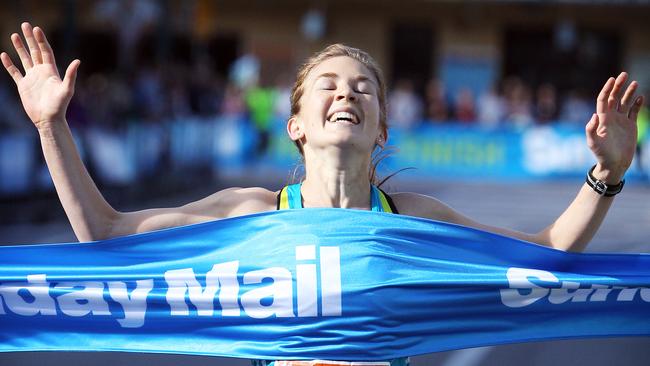
“From there I was selected for the half-marathon world championships in China and got exposed to real top-level international competition. Then, in 2011, I went to Canberra for a handicap race, (and) met with Rob de Castella, among others, for coffee.
“They were talking about the London Olympics and he said ‘Have you ever thought about trying to qualify?’ I said ‘What for?’ and they said ‘Why don’t you step up to the marathon?’ Because I absolutely idolised these royalties of distance running I thought, if they’ve suggested it, then why not?”
So in March, 2012, Trengove made her marathon debut in Nagoya, Japan, where she ran 2hr 31min, which qualified her for the London Olympics.
Of the nine marathons Trengove has done, the hardest one to finish was the Rio Olympics last year because of a foot injury, which hampered her preparation, and the hot conditions.
“After halfway one of my toenails went and I just remember the final 7-8km being such a blur. I couldn’t see myself getting to the finish line but somehow I got there but didn’t have that real buzz,” she said.
If that was her toughest moment in the sport what has been the best?
“I’ve got four,” she says.
Number one is crossing the line in Nagoya and realising she was going to the Olympics.
“I remember lying on my bed that afternoon looking up at the roof, honestly, in disbelief,” she says.
The others, in no particular order, were winning her first Sunday Mail City-Bay Fun Run in 2010, winning bronze in Glasgow where Steve Moneghetti ran with her on the outside of the fence for the final kilometre, and this year’s world championships, where ninth place proved to her that anything is now possible. “It (the world championships) was my strongest ever marathon,” Trengove says. “Everything about it. I felt much more attacking than ever before and (I) was able to respond to changes of pace.”
Her next big goal is the Gold Coast Commonwealth Games in April and then the Toyko Olympics in 2020.
“We have a very strong Commonwealth. I would love to go better than Glasgow but at the same time my main goal is just to get my best preparation ever,” she says.
“More than a position goal, it will be to nail my preparation and to finish with ultimately a PB effort but, given the conditions at that time of year, (it) may not be my fastest time.
“I haven’t thought too much beyond that. We’ll sit down and evaluate, but going into any Olympics I’d want to strive for the top 12-15.
“That’s dreaming big, but Japan is a phenomenal country for distance running and I can’t even imagine how big the marathon would be, it’s so exciting.”

